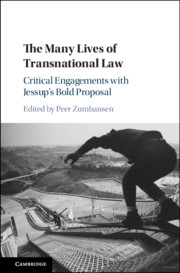(Source: CUP)
Cambridge University Press is publishing a new book on
former ICJ Judge Jessup and transnational law.
ABOUT THE BOOK
In 1956, ICJ judge Philip Jessup highlighted the gaps
between private and public international law and the need to adapt the law to
border-crossing problems. Today, sixty years later, we still ask what role
transnational law can play in a deeply divided, post-colonial world, where
multinationals hold more power and more assets than many nation states. In
searching for suitable answers to pressing legal problems such as climate
change law, security, poverty and inequality, questions of representation,
enforcement, accountability and legitimacy become newly entangled. As public
and private, domestic and international actors compete for regulatory
authority, spaces for political legitimacy have become fragmented and the
state's exclusivist claim to be law's harbinger and place of origin under
attack. Against this background, transnational law emerges as a conceptual
framework and method laboratory for a critical reflection on the forms, fora
and processes of law making and law contestation today.
ABOUT THE AUTHOR
Peer Zumbansen, King's College London
Peer Zumbansen is the founding Director of the Transnational Law Institute at King's College London and teaches at King's and Osgoode Hall Law School, Toronto. He is the series editor of Cambridge Studies in Transnational Law and co-editor-in-chief of Transnational Legal Theory.
Peer Zumbansen is the founding Director of the Transnational Law Institute at King's College London and teaches at King's and Osgoode Hall Law School, Toronto. He is the series editor of Cambridge Studies in Transnational Law and co-editor-in-chief of Transnational Legal Theory.
TABLE OF CONTENTS
Introduction: transnational law, with and beyond Jessup Peer
Zumbansen
Part I. Transnational Law: The Public and the Private:
1. Jessup at the United Nations: international legacy, transnational possibilities Stephen Minas
2. The concept of a global legal system Christopher A. Whytock
3. How comity makes transnationalism work Thomas Schultz and Niccolò Ridi
Part II. Transnational Law as Regulatory Governance:
4. Aiding and abetting in theorising the increasing softification of the international normative order – a darker legacy of Jessup's transnational law? Karsten Nowrot
5. From international law to transnational law, from transnational law to transnational legal orders Gregory Shaffer and Carlos Coye
6. Transnational law in the Pacific Century: mapping pesticide regulation in China Francis Snyder, Zhouke Hu and Lili Ni
7. Transnational law in context: the relevance of Jessup's analysis for the study of 'international' arbitration Florian Grisel
8. Transnational Law and Adjudication – Domestic, International and Foreign Intersections Bryan Horrigan
9. Transnational Law and Global Dispute Resolution Shahla Ali
10. Conflicts of law and the challenge of transnational data flows Paul Schiff Berman
11. What lex sportiva tells you about transnational law Antoine Duval
12. Family law: a blindspot Ivana Isailovic
Part III. Transnational Law: The Field's Normative Stakes:
13. Locating private transnational authority in the global political economy A. Claire Cutler
14. Transnational law as drama Jothie Rajah
15. Transnational law as unseen law Natasha Affolder
16. The Cri De Jessup sixty years later: transnational law's intangible objects and abstracted frameworks Larry Catá Backer
17. The private life of transnational law: reading Jessup from the postcolony Prabhakar Singh
18. After the backlash: a new pride for transnational law? Ralf Michaels
Part IV. Conclusion: Epilogue – difficulties for every solution: defining transnational law at the edge of transdisciplinarity Vik Kanwar.
Part I. Transnational Law: The Public and the Private:
1. Jessup at the United Nations: international legacy, transnational possibilities Stephen Minas
2. The concept of a global legal system Christopher A. Whytock
3. How comity makes transnationalism work Thomas Schultz and Niccolò Ridi
Part II. Transnational Law as Regulatory Governance:
4. Aiding and abetting in theorising the increasing softification of the international normative order – a darker legacy of Jessup's transnational law? Karsten Nowrot
5. From international law to transnational law, from transnational law to transnational legal orders Gregory Shaffer and Carlos Coye
6. Transnational law in the Pacific Century: mapping pesticide regulation in China Francis Snyder, Zhouke Hu and Lili Ni
7. Transnational law in context: the relevance of Jessup's analysis for the study of 'international' arbitration Florian Grisel
8. Transnational Law and Adjudication – Domestic, International and Foreign Intersections Bryan Horrigan
9. Transnational Law and Global Dispute Resolution Shahla Ali
10. Conflicts of law and the challenge of transnational data flows Paul Schiff Berman
11. What lex sportiva tells you about transnational law Antoine Duval
12. Family law: a blindspot Ivana Isailovic
Part III. Transnational Law: The Field's Normative Stakes:
13. Locating private transnational authority in the global political economy A. Claire Cutler
14. Transnational law as drama Jothie Rajah
15. Transnational law as unseen law Natasha Affolder
16. The Cri De Jessup sixty years later: transnational law's intangible objects and abstracted frameworks Larry Catá Backer
17. The private life of transnational law: reading Jessup from the postcolony Prabhakar Singh
18. After the backlash: a new pride for transnational law? Ralf Michaels
Part IV. Conclusion: Epilogue – difficulties for every solution: defining transnational law at the edge of transdisciplinarity Vik Kanwar.
More info here


No comments:
Post a Comment